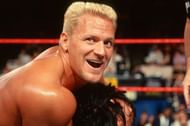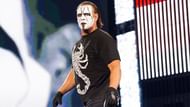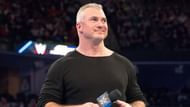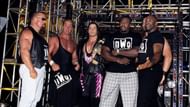There’s little question that when WWE bought WCW, it was one of the biggest business moves in wrestling history. It was the biggest wrestling company in the world buying out the second biggest one and its chief competitor, and included bringing a boatload of new talent like Booker T and Diamond Dallas Page, and intellectual property like the New World Order, not to mention the WCW tape library—an asset few people realized the full value of back in 2001.
But what if the deal had never gone down?
Eric Bischoff has explained in numerous interviews, documentaries, and his book that he was assembling a deal to buy the company itself, and surely there were other business people or folks from wrestling itself who would have shared that interest. This article speculates regarding five possibilities of what might have been if someone else got a hold of WCW, or if WWE simply hadn’t been interested in this historic acquisition.
WWE doesn't want these wrestlers back - Find out now!
#5 No Invasion

After buying WCW, and after having more quietly acquired ECW as well, WWE launched the Invasion angle—a storyline that dominated the second half of 2001. One of the central premises was casting WWE as a united friends, and mostly as faces (at least in the short term) against the heel insurgency from the Alliance, composed chiefly of guys from rival companies.
The Invasion is one of the most famous failures in mainstream wrestling history--Between not having top tier talents like Goldberg, Sting, Hulk Hogan, or Ric Flair off the bat, and a bias toward featuring guys who’d defected to WWE early, or in some cases hadn’t ever even been a part of a competing promotion.
Eliminate the Invasion, and wrestling history looks differently. Many regard WrestleMania 17 as the end of the Attitude Era, not only for a change in culture, but for some of WWE’s best storylines abruptly stopping in favor of a widely panned all-encompassing angle. Maybe without the Invasion Steve Austin gets over as a solo heel. Maybe Booker T signs and comes in as an individual face; same for Diamond Dallas Page. Regardless, while the Invasion wasn’t good, it was undeniably important for its scope, and for all the potential ideas it cut off.
#4 No TNA

Jeff Jarrett was the spark plug behind founding Total Non-Stop Action—the TNA company that grew into Impact Wrestling. Some of that has to do with an entrepreneurial and arguably a sense of wrestling traditionalism not represented in WWE at the time.
Some of it is about Jarrett himself.
Jarrett had burned bridges with WWE, reportedly holding them up for money on his way out the door in order to drop the Intercontinental Championship to Chyna. So, he in large part had a choice between starting his own promotion or working the remainder of his career in relative obscurity, trying to find bookings with big independents and on the international scene.
Had WWE specifically not bought out WCW, the company probably would have shrunken to a smaller scale, but nonetheless survived in some way shape or form. With that, Jarrett would still have a high profile place where he could work (and was already positioned around the main event) and thus wouldn’t have been driven to found TNA.
#3 Sting’s debut in doubt

There are a number of wrestling talents who crossed WWE and WCW lines relatively fluidly, and are more or less equally associated with each brand—guys like Kevin Nash, Scott Hall, and Curt Hennig. There were also those relative loyalists to WWE like The Undertaker and Shawn Michaels who stayed with WWE for periods of decades and only truly starred for that promotion.
On the flip side, we have Sting. While he worked other places, his legacy is inextricably connected to WCW, where he spent the prime of his career and attained his greatest fame and kayfabe accomplishments. It’s telling that, even with the buyout, he still didn’t go to WWE for over a decade. Had WCW hung around as it’s own entity, even with a much lower profile, there’s a chance he never would have crossed over to WWE for a video game or Hall of Fame induction, let alone a brief series of matches.
#2 Shane McMahon stays face

Leading up to WWE’s real life acquisition of WCW, WWE pushed a storyline of Shane McMahon, as a face, rising up to challenge his megalomaniac heel father. The storyline was ostensibly built for WrestleMania 17, with a blow off match that was much more heavily weighted toward sports entertainment shenanigans than an exhibition of athleticism in the ring.
WWE wove the buyout into the McMahon family angle, though, with the suggestion that Shane had bout WCW out from under his father’s nose right before WrestleMania. Besides being a subplot to their feud at the time, WWE set up the foundation for Shane to be the on-air leader for the WCW brand. Most indications are that WWE wanted it to be a legitimate second brand, and would market WWE and WCW not so differently from how it markets Raw and SmackDown today, and so Shane could reasonably be the face presiding over his brand.
However, when the initial reception to WCW was cold, and no networks were interested in a show under its brand, WWE altered course to make them a heel faction, and take Shane with them.
In the long term, things may have played out similarly in this timeline, with Shane ultimately flip-flopping across face and heel lines. Without the WCW buyout, though, he also may have rode out his face momentum much longer.
#1 WCW lives on

Had Eric Bischoff succeeded in buying WCW, or had another outside party done so, it’s impossible to know if the company would have survived. Bischoff, for one, cited Turner not offering television as part of the package as a deal breaker.
Had he re-conceptualized the product to something more like TNA’s early weekly PPV format, or focusing more on house shows and home video, there were ways in which WCW could have carried forward. If it were to have survived up to the modern Internet era, there’s little reason to think it couldn’t have cashed in on its name recognition from decades before, and at least delivered at the level that promotions like New Japan, Ring of Honor, or Lucha Underground are functioning at today.
Of course, critics will say that a step that far back wouldn’t really be WCW anymore, but relative to now being a nostalgia brand that WWE trots out elements of now and again, and exploits via its Network, the company could still be its own entity operating today.
Triple H hates these wrestlers? - Check out now!

